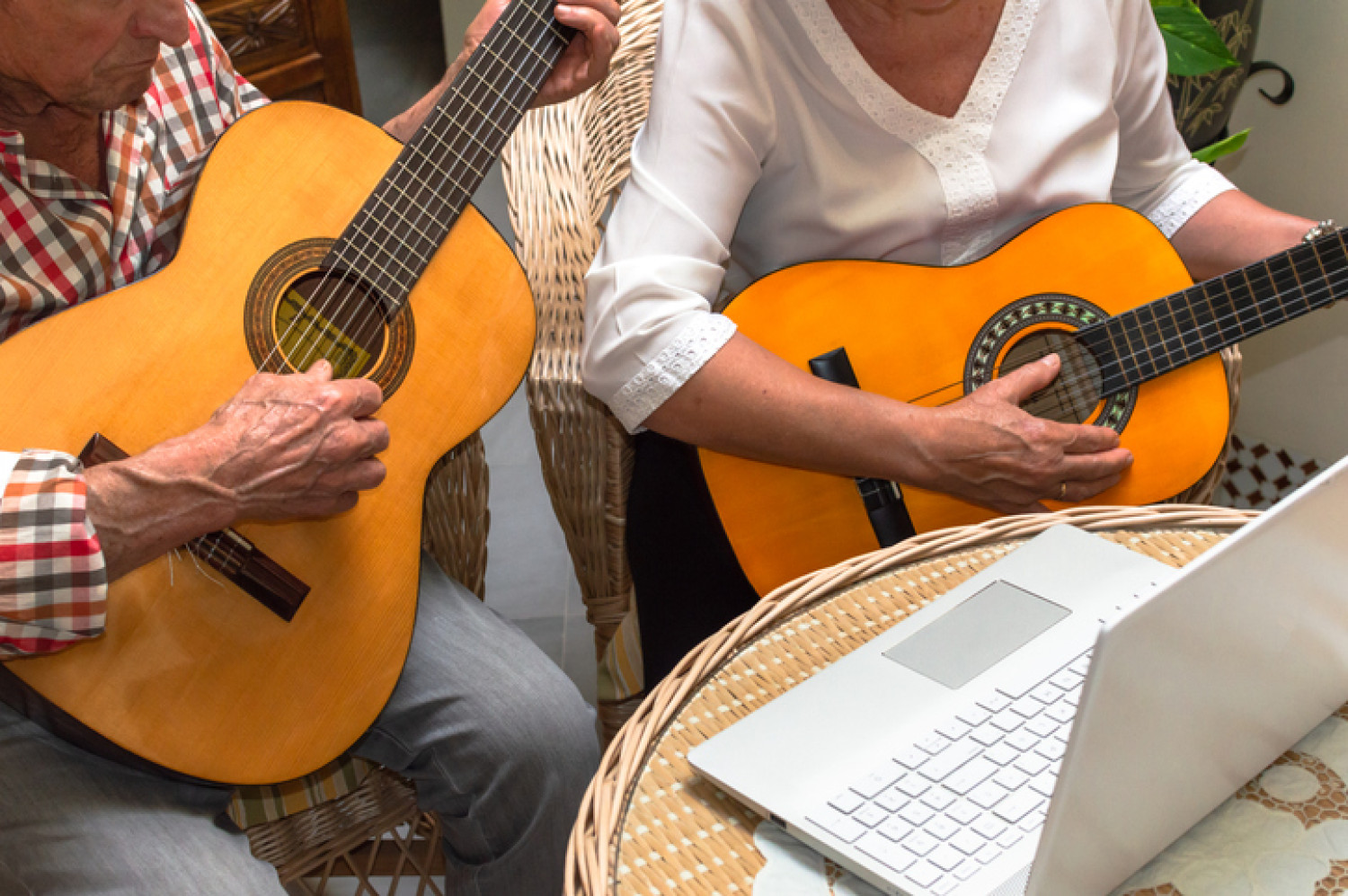Can Music Therapy Help People With Dementia?
11 April, 2024
If you or your loved one has recently received a dementia diagnosis, you are undoubtedly going through a very difficult time in your life. Dealing with this news is not easy, and you may be struggling to come to terms with this new reality. To make things even more challenging, there can be a mountain of information to take in about the condition, and effective treatment options can be difficult to find.
Given these challenges, we wanted to use this blog to focus on one particular intervention that can be effective in helping people with dementia, music therapy. While the science in this area is still developing, music therapy shows significant promise when it comes to treating some of the symptoms of dementia and improving patient well-being. Despite this, it remains an underutilised treatment option.
Given this, we will provide you with a brief overview of music therapy and how it can assist people with dementia, the different types of music therapy interventions, and a quick look at what the science says on this topic.

The behavioural and psychological symptoms of dementia
Dementia affects around 55 million people worldwide, according to World Health Organization (WHO) statistics.
It's important to state at the the outset, that everyone living with dementia is different in terms of how the disease affects them. There is a vast array of symptoms that can be associated with dementia and these symptoms vary over time.
This is one of the reasons why it's important to explore a variety of treatment options. Some things will work well with some people living with dementia and not others. Some interventions may be effective for a period of time, but then lose their effectiveness as time goes on.
Dementia is associated with a range of cognitive disturbances such as memory loss and communication difficulties. It also often involves a range of behavioural and psychological symptoms, including:
agitation
depression
anxiety
apathy
irritability
delusions
hallucinations
While there is no cure for people living with dementia, addressing these symptoms effectively, is crucial for improving overall well-being and care outcomes for individuals. Cognitive performance is not static and cognitive training and other interventions can cause positive changes to an individual's cognitive processes.
Music therapy for dementia

Music therapy for dementia is a research-based practice that uses musical interventions to help individuals with cognitive or emotional challenges. Often involving an initial mini-mental state examination, music therapy can involve the creation of music, or can involve singing, dancing or simply listening to music.
Music therapy sessions are run by qualified therapists who design different individualised music interventions to help people achieve their therapeutic goals. Music intervention has been used with a wide range of cohorts, including those with mental health needs, developmental and learning disabilities and brain injuries.
Of most relevance to this discussion, however, music therapy has also been used extensively with people with Alzheimer's disease and other aging-related conditions. The effects of music therapy have been beneficial for older adults with mild Alzheimer's disease and for those with more advanced Alzheimer's disease.
Why is music important for people living with dementia?
Music is important for people living with dementia because research suggests that memory associated with music-related experiences like listening to music, dancing and playing instruments, may take place in a part of the brain that's separate from the areas of the brain that create our regular memories.
These musical memory areas are often less affected by the cognitive decline associated with dementia than other memory areas in the brain. As a result, people with dementia are often more likely to remember musical memories than conventional memories.
Because of this, music has the potential to provide significant benefits to individuals with dementia. By harnessing these remaining musical memories, music therapy can affect individuals in a variety of valuable ways that can provide benefits to cognition and mental health.
Types of music therapy interventions
Music Creation

While not for everyone, this form of active music therapy can involve individuals actively participating in the making of music. They can play instruments, compose songs, or improvise music with the guidance of a music therapist.
This form of music intervention lets people express themselves non-verbally, be creative and communicate emotions they might find difficult to express through words. Music creation can help reduce anxiety, enhance mood and improve motor skills.
Some versions of this approach for those with mild cognitive impairment, can also benefit cognitive functions by engaging the brain in complex processes. In so doing, it can improve dementia symptoms.
Singing

This form of music therapy for dementia is often effective for those who had a history of singing earlier in life, whether this was in musical groups, choirs or in a religious context.
Singing in music therapy can be effective for memory recall in individuals with dementia. It can also help with speech in those with communication issues and can also improve mood and reduce stress.
Singing sessions usually involve the singing of familiar songs selected by a music therapist. Group singing sessions can also foster a sense of community and belonging, offering social support and encouraging social interaction, which is beneficial for those feeling isolated or withdrawn.
Dancing

Dancing in music therapy combines movement with music to encourage physical exercise, emotional expression, and social interaction. It can be especially beneficial for improving balance and coordination in elderly clients or those with motor impairments. Dancing can be very effective in improving both cognitive and physical abilities.
This form of music therapy for dementia also helps to promote social connection when done in group settings and can also help reduce feelings of isolation and loneliness.
Listening

Music listening as a therapeutic intervention is perhaps the most common form of music therapy.
It usually involves the use of pre-recorded music selected by the music therapist. It can be aimed at relaxation and stress reduction, stimulation for cognitive abilities, or as a stimulus for reminiscence.
Receptive music therapy can be a passive experience, or an active one that involves discussing the music and any memories it evokes and how these make the individual feel.
How can music therapy support people living with dementia?
Music therapy can provide a range of brain function benefits to people living with dementia. These include:
Enhanced Memory Recall: Music therapy can trigger memories and evoke positive emotions, that can provide a sense of comfort and familiarity and enhance overall cognitive ability.
Improved Mood and Emotional Well-being: Engaging with music can help to improve the mood of individuals with dementia. It has the potential to reduce symptoms associated with depression and anxiety and improve overall quality of life.
Increased Social Interaction: Group music therapy sessions can encourage social interaction and can help alleviate isolation and loneliness that often go hand in hand with dementia. This is particularly true for those with early dementia.
Support for Cognitive Functions: Music therapy intervention can also provide cognitive benefits for people with dementia. It can help to preserve speech and language skills, reduce behavioural disorders and improve concentration, focus and other brain functions.
Reduced Agitation: Music therapy can soothe agitation, and reduce problematic behavioural symptoms and mild psychiatric symptoms in individuals with severe dementia.
Physical Benefits: Dancing and playing instruments can improve mobility, reduce chronic pain and influence coordination. This can have flow-on effects on physical health and overall quality of life.
Is music therapy actually effective in helping people with dementia?
While music therapy may promise a range of quality-of-life benefits when it comes to managing dementia, it's important to have a look at the science to work out how reliable these claims are.
Thankfully, a number of studies have looked at the effectiveness of music therapy in treating the symptoms of dementia and have provided some promising results.
A meta-analysis looking at the effect of music therapy on Alzheimer's disease patients across Europe, Asia and the USA, examined listening and singing music therapy approaches and compared them with non-music interventions. This systematic review conducted a quality assessment of the studies and found that music therapy can play an important role in maintaining global cognition, memory, language, information processing speed, verbal fluency, and attention in dementia patients. Further research was encouraged.
One review found cognitive and non-cognitive benefits for music therapy when combined with pharmacological interventions. Another indicated an overall improvement in cognitive function and mood among people with dementia in the musical therapy intervention group, despite varying quality of evidence, variation in preferred reporting items and varied inclusion and exclusion criteria.
Lastly, an expansive systematic review looking at a number of randomised controlled trials, assessed the effects of music-based interventions on people with dementia, covering 82 studies that included 43 interventional clinical trials with control groups, and 39 systematic reviews or meta-analyses. This review showed significant improvements in verbal fluency and significant reductions in anxiety and depression compared with the control group, as a result of music therapy.
While there are limits to what a randomised controlled trial can show, reporting systematic reviews suggests that music-based therapeutic interventions have the potential to be beneficial for people with dementia when compared to a control group. While a clinical trial cannot tell us everything, they suggest that musical therapy can improve some dementia symptoms and positively influence well-being. However, issues with quality of evidence and inclusion criteria also suggest that for dementia a systematic review with more randomized controlled study is needed to fully examine the connection between music and dementia.

What type of music is most effective for people with dementia?
There does not appear to be one type of music that is most effective for people with dementia. Rather, what can be important, is identifying the type of music that is meaningful to each person.
Often this can involve exploring an individual's life history and thinking about the types of familiar music they may have listened to when they were young.
Songs that are nostalgic or personally significant can be extremely powerful in music therapy sessions. Live music can also be effective.
More information
This NPR podcast provides further information on some exciting research on dementia and music therapy.
You can also read more about a recent research project collaboration between the University of Sydney and the Sydney Conservatorium of Music.
Information can also be found through the American Music Therapy Association and the Australian Music Therapy Association.
How can Focus Care help?
Focus Care is an approved aged care provider that offers music therapy sessions led by certified music therapists for people with dementia. Music therapy sessions can be provided for individuals or in group settings. These sessions are available for those with Home Care Packages or can be privately funded. Focus Care also offers other Montessori methods of dementia care such as art therapy and pet therapy.
No previous experience playing musical instruments is necessary to benefit from an approved music therapy program. Our professional music therapists customise each session according to the client's abilities and interests, to ensure a personalised and valuable experience.
Although a dementia diagnosis can be extremely challenging, at Focus Care, we are committed to supporting you through this process and are available any time, to answer any questions you have about musical or painting interventions or about our services more generally. For more information or to schedule a consultation, please contact us.




